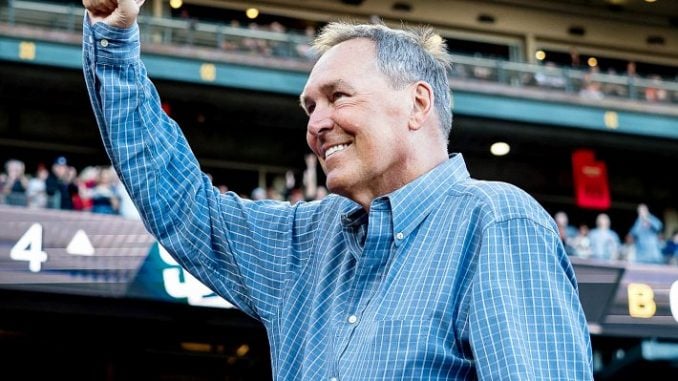
Dwight Clark, the San Francisco 49ers great made famous by “The Catch” of a pass from Joe Montana that beat the Dallas Cowboys in the NFC Championship Game in 1982, died Monday at age 61 after an extended battle with amyotrophic lateral sclerosis (ALS).
Clark’s wife, Kelly, announced the news via a message on her husband’s Twitter account.
“I’m heartbroken to tell you that today I lost my best friend and husband,” Clark’s wife tweeted. “He passed peacefully surrounded by many of the people he loved most. I am thankful for all of Dwight’s friends, teammates and 49ers fans who have sent their love during his battle with ALS. Kelly Clark.”
Clark, a native of Kinston, N.C., who won two Super Bowls as a 49ers player and three as an executive, wrote on Twitter in March about having ALS and wondered about a link to playing football and his disease.
“I’ve been asked if playing football caused this,” Clark wrote. “I don’t know for sure. But I certainly suspect it did. And I encourage the NFLPA and the NFL to continue working together in their efforts to make the game of football safer, especially as it relates to head trauma.”
A statement released by the 49ers said, in part, “(We) join together to mourn the death of one the most beloved figures in 49ers history. For almost four decades, he served as a charismatic ambassador for our team and the Bay Area. Dwight’s personality and his sense of humor endeared him to everyone he came into contact with, even during his most trying times. The strength, perseverance and grace with which he battled ALS will long serve as an inspiration to so many. Dwight will always carry a special place in our hearts and his legacy will live on as we continue to battle this terrible disease.”
Clark’s last public appearance was last October at “Dwight Clark Day” when he addressed 49ers fans at halftime of the team’s game against the Cowboys at Levi’s Stadium. The opponent was an appropriate choice, since Clark’s legendary reception decades earlier at Candlestick Park allowed San Francisco to shock Dallas 28-27 in the NFC title game. Clark’s leaping catch of Montana’s high heave in the final minute put the Niners in their first Super Bowl, which they won over the Cincinnati Bengals.
The NFL’s official Twitter account wrote, “One of the most memorable plays in @NFLHistory. The Catch. Rest In Peace, Dwight Clark.”
The two-time All-Pro wideout recorded a career-high 85 catches and 1,105 yards in San Francisco’s first Super Bowl season, following with an NFL-high 60 receptions in the strike-shortened 1982 season. In the five-year span from 1980-84, Clark led the NFC with 349 receptions. Thanks to his years as one of Montana’s most reliable targets, Clark ranks among the team’s all-time leaders in catches (506, fourth), receiving yards (6,750, third) and touchdown catches (48, tied for sixth).
Jerry Rice, the man who would go on to set every significant receiving record for the 49ers and a teammate of Clark’s, also tweeted his condolences.
Rice’s tweet read, “Love you bro Dwight Clark!! RIP”
While Clark is not a Pro Football Hall of Famer, he was in the 49ers’ inaugural Hall of Fame class in 2009 and the team retired his No. 87 in 1988, a year after he retired after nine seasons, all in San Francisco.
Cris Collinsworth, a contemporary of Clark in the NFL and now a broadcaster with NBC, tweeted, “Dwight Clark may have been the most humble star the NFL has ever produced. Yes he was fun and funny, but Dwight had an innate goodness to him that will never be forgotten by those who had the good fortune to know him. May God bless Dwight and his family.”
Born in Kinston in 1957, Clark played quarterback at Garinger High School in Charlotte and went to Clemson originally as a strong safety and only caught 33 passes in his college career. The 49ers still drafted him, albeit in the 10th round in 1979 when the NFL Draft lasted 12 rounds.
During his first NFL training camp, Clark roomed with future Hall of Famer Montana, and an iconic quarterback-receiver connection was born.
Once retired from football, Clark spent nine seasons in the 49ers’ front office, including as the team’s general manager in 1998. Clark then joined the Cleveland Browns as the team’s general manager and director of football operations from 1999-2002.
Clark is survived by his wife and three children, daughter Casey and sons Riley and Mac, all from a previous marriage.



